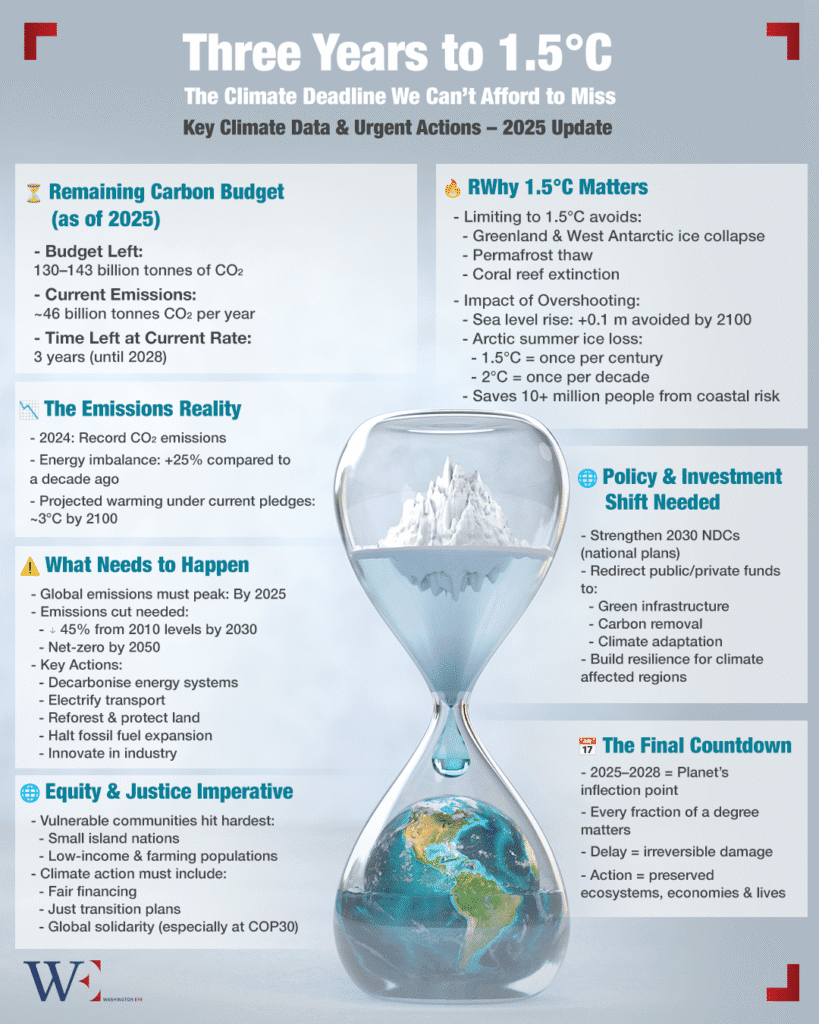A new study by over 60 climate scientists, led by Joeri Rogelj and Piers Forster, warns that at the current emission trajectory, the cumulative carbon dioxide combusted will exhaust the remaining “carbon budget” by 2028—just three years from now—pushing the planet past the 1.5 °C threshold established in the Paris Agreement. As of 2025, the remaining budget is estimated at only 130–143 billion tonnes of CO₂, against an annual emission rate of approximately 46 billion tonnes.
This projection implies that any delay in reducing emissions could usher in an era of irreversible climate change, with the 1.5 °C limit either being breached temporarily or permanently, depending on the trajectory. Temporary overshoots, driven by short-term weather variability (such as El Niño events), may already have occurred in recent years.
Why 1.5 °C Still Matters
The IPCC’s special report clarifies that even half a degree of additional warming significantly amplifies climate risks. Remaining below 1.5 °C instead of drifting toward 2 °C dramatically reduces the odds of triggering dangerous tipping points—such as Greenland and West Antarctic ice sheet collapse, permafrost thaw, and coral reef die-off.
Specifically, holding warming near 1.5 °C—especially without overshoot—would likely limit Arctic summer ice loss to once per century, compared to once per decade at 2 °C. It would also dilute sea level rise by approximately 0.1 m by 2100—potentially sparing over 10 million people from exposure to coastal hazards.
The Stakes Are Intensifying
The acceleration of warming isn’t just incremental—it’s exponential. Global energy imbalances are reported to be 25% larger than a decade ago, intensifying heatwaves, droughts, storm frequency, and extreme precipitation events. Concurrently, atmospheric CO₂ emissions hit record levels in 2024, undermining any tenuous progress on emissions reduction.
Even with current national commitments under the Paris Agreement (Nationally Determined Contributions), the world is projected to warm by around 3 °C by century’s end—not 1.5 °C—unless immediate and drastic action is taken.
What It Demands: Swift, Systemic Action
Climate analysts stress that global greenhouse gas emissions must peak no later than 2025 and fall by roughly 45% from 2010 levels by 2030, reaching net-zero by 2050, to maintain any reasonable chance of staying within 1.5 °C.
This transformation requires sweeping changes across sectors: deep decarbonization of energy, reforestation and sustainable land-use, robust electrification of transportation, and industrial innovation. Critically, fossil-fuel infrastructure must be phased out with urgency, not expanded.
Beyond the Goal: The Imperative of Equity
Scientific assessments also highlight that vulnerable populations—small island states, low-income communities, and agricultural regions—stand to bear disproportionate burdens if warming surpasses 1.5 °C. Ensuring just transition pathways and support systems is not only ethical but essential; failure to address equity could fuel political backlash and erode global solidarity at critical junctions such as COP30.
The Path Ahead: Implications for Policy and Society
Time is not an ally. The looming three-year horizon emphasizes the inadequacy of incrementalism. Countries must significantly strengthen their 2030 pledges ahead of COP30. Financial systems need reorientation—public and private investments must prioritize green infrastructure and carbon removal technologies. Meanwhile, adaptation must be amplified—particularly for regions already facing climate-induced disasters.
Even if the 1.5 °C threshold is crossed, research insists that continued emission reductions yield substantial benefits, reducing prolonged overshoot and curbing irreversible damages. Every fraction of a degree avoided translates into preserved ecosystems, lives, and economic stability.
A Final Thought
The next three years represent a critical inflection point for the planet. What was once considered an ambitious climate goal—limiting warming to 1.5 °C—is now a rapidly closing window of opportunity. The challenge is no longer theoretical; it demands immediate, transformative change across all sectors of society. Delaying action, even by a few years, could lock in irreversible damage and set the world on a path toward escalating climate extremes. Every fraction of a degree matters. The decisions made now will shape not only the health of our environment, but the stability of our economies, the safety of our communities, and the future we leave for generations to come.














